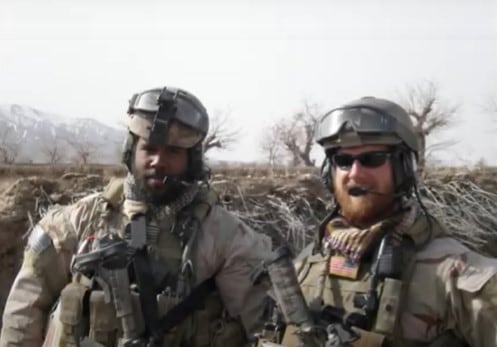Sgt. 1st Class Julian Kitching hit rock bottom in 2017 when he tried to take his own life. The guilt and grief over losing brothers-in-arms, and the traumas he’d witnessed during combat deployments to the Middle East as an Army Green Beret, had taken their toll.
After the unsuccessful suicide attempt, years of substance abuse and pushing away loved ones, Kitching decided to turn to the Boston Red Sox Foundation’s Home Base Program, an organization that offers all-expenses-paid help to those battling the invisible wounds of war. The same program had once helped Kitching’s brother — Lt. Col. Brian Kitching, an Army Ranger — turn his life around following a difficult deployment.
“I came to the program at a really difficult point in my life, where the external view of my life was pretty good,” Kitching said. “I was a non-commissioned officer. I was making decent money, but I couldn’t stop thinking about traumatic events that took place while I was serving. When I came to Home Base, the entire experience was amazing. The way they take care of you, the things they teach you, the frameworks that they employ to get you back on track. ... It was life-changing.”

The Red Sox Foundation, which began to take shape in 2007 following the team’s World Series win and a subsequent visit by players and front office staff to Walter Reed Army Medical Center, offers help for those suffering from anxiety, depression, substance abuse disorders, military sexual trauma and traumatic brain injuries.
“I spoke with one of the chief administrators of Walter Reed, who was talking about the fact that so many soldiers are coming back after Iraq and Afghanistan with PTSD and traumatic brain injuries,” Red Sox Chairman Tom Werner said in an interview with Boston Magazine. “I thought he would say 15 percent — he said it could be as much as 50 percent. On the flight back, I talked with the team doctor about what we could do.”
The answer was Home Base.
Since its inception, the Home Base Foundation has grown into an international organization that has served more than 25,000 veterans and family members across all 50 states and overseas.
Active duty, reserves, veterans and National Guard members are all welcome to attend the program’s clinics, where varying methods of treatment are offered regardless of discharge status. Most commonly touted is the organization’s intensive two-week course. Home Base flies those in need to a treatment center while covering the cost of travel, lodging and food.
“No one pays a nickel,” Home Base Director and retired Brig. Gen. John Hammond said. “Even Yankees fans.”
According to Kitching, the program takes a holistic approach as well as a clinical one. Attendees see psychiatrists and other mental health specialists, learning how to cope with traumas through discussions, meditations and bonding with other service members.
Individual plans of care are also shared with Veterans Affairs social workers, who continue to monitor the service member’s progress once attendees have returned home.
“We’ve lost 100,000 [to suicide] since 9/11. It is truly an epidemic,” Hammond said. “Veterans are three times more likely than their counterparts to die by suicide, even though they come from the top percentiles of the nation already screened for mental issues. So, when you look at that, something’s clearly wrong.”
Internal efforts, coupled with a partnership with Massachusetts General Hospital, however, allows the foundation to find the best specialists and most innovative care around, Hammond added.
“The number one reason why people take their lives is because they lose hope,” he said. “We offer hope for a day without pain, for the ability to reclaim your life, and have the life you’ve earned and richly deserve.”
Rachel is a Marine Corps veteran and a master's candidate at New York University's Business & Economic Reporting program.









